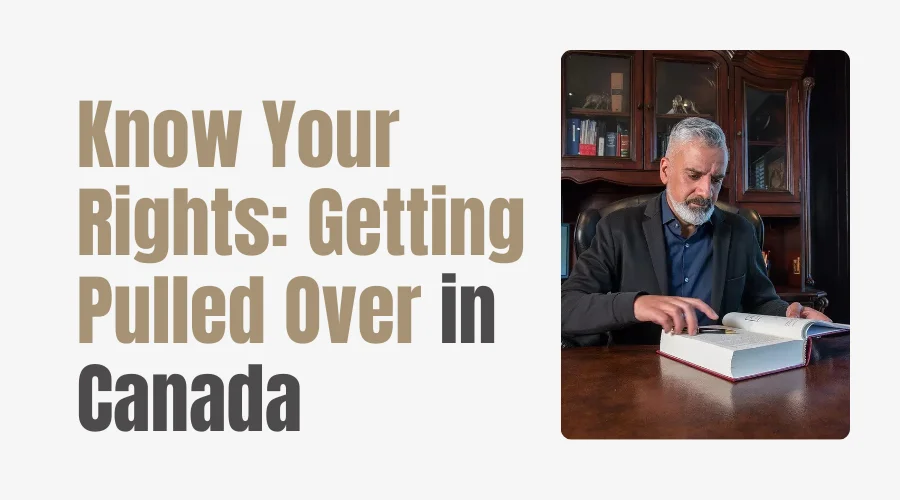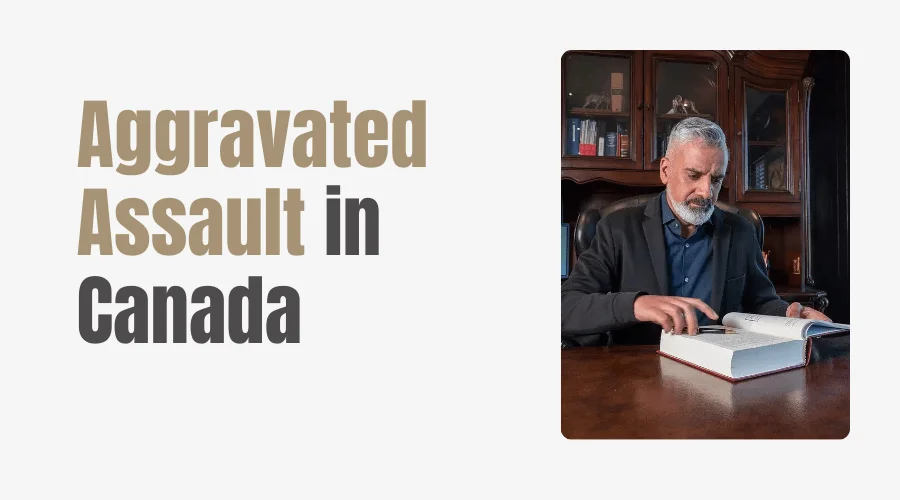How Long is a Life Sentence in Canada: What You Need to Know

Twenty-five to life is something all of us have heard, whether in movies or real life. The concept of life imprisonment exists in many legal jurisdictions, and is reserved as punishment for society’s most serious crimes. In fact, Canada’s criminal justice system has a very distinct life sentence regime.
Suny Virk, our experienced criminal lawyer in Mississauga, has created this guide to help you understand life sentences in Canada, its timeframe, and other key details.
How Long is a Life Sentence in Canada?
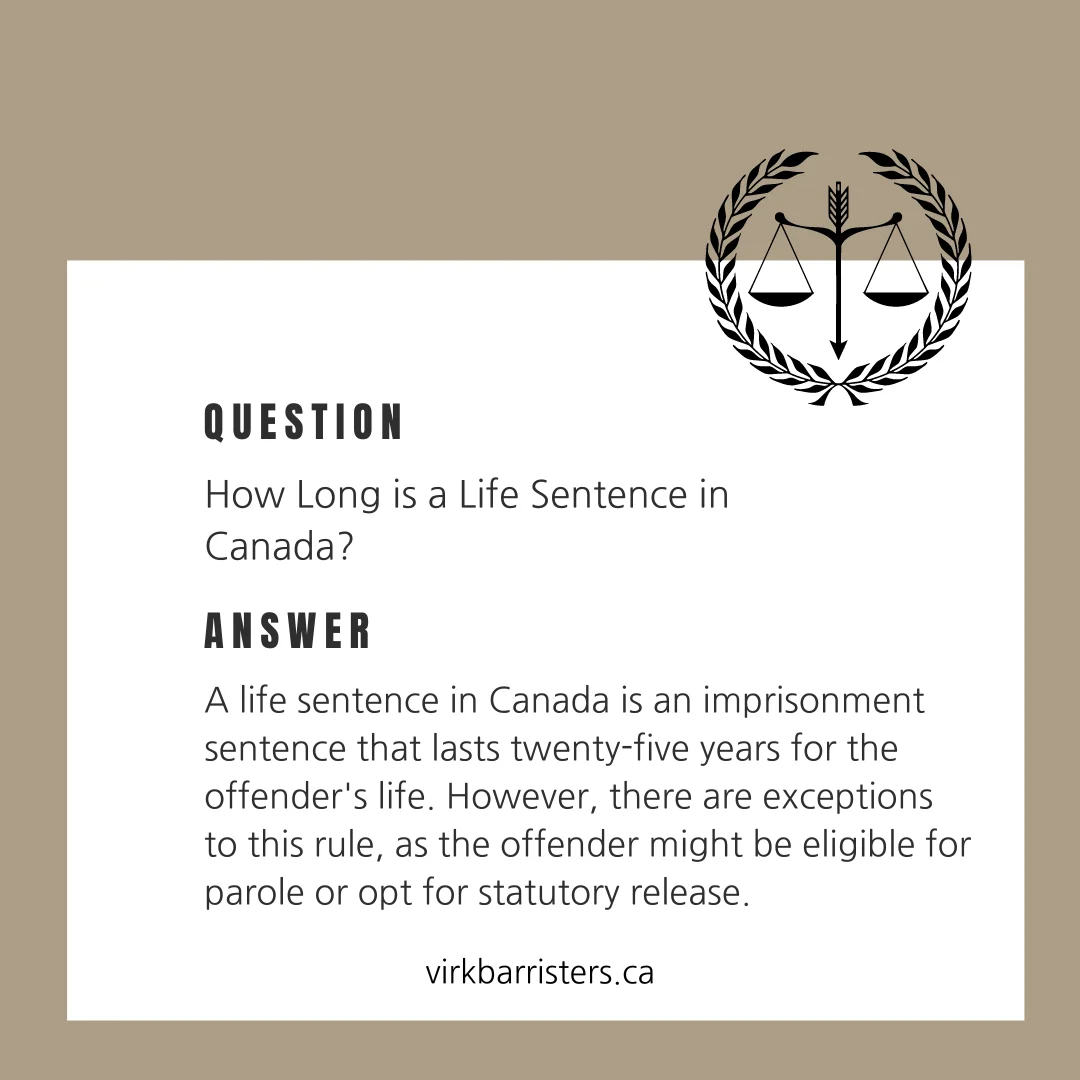
A life sentence in Canada is an imprisonment sentence that lasts twenty-five years of the offender’s life. However, there are exceptions to this rule, as the offender may be eligible for parole or statutory release.
First-degree murder is the most obvious crime that carries a life sentence. According to the Criminal Code of Canada, any offender guilty of first-degree murder will be eligible for full parole after twenty-five years from the date they were taken into custody.
Please note that parole eligibility doesn’t guarantee an automatic release and will be discussed below.
What Type of Offences Carry a Life Imprisonment Sentence in Canada?
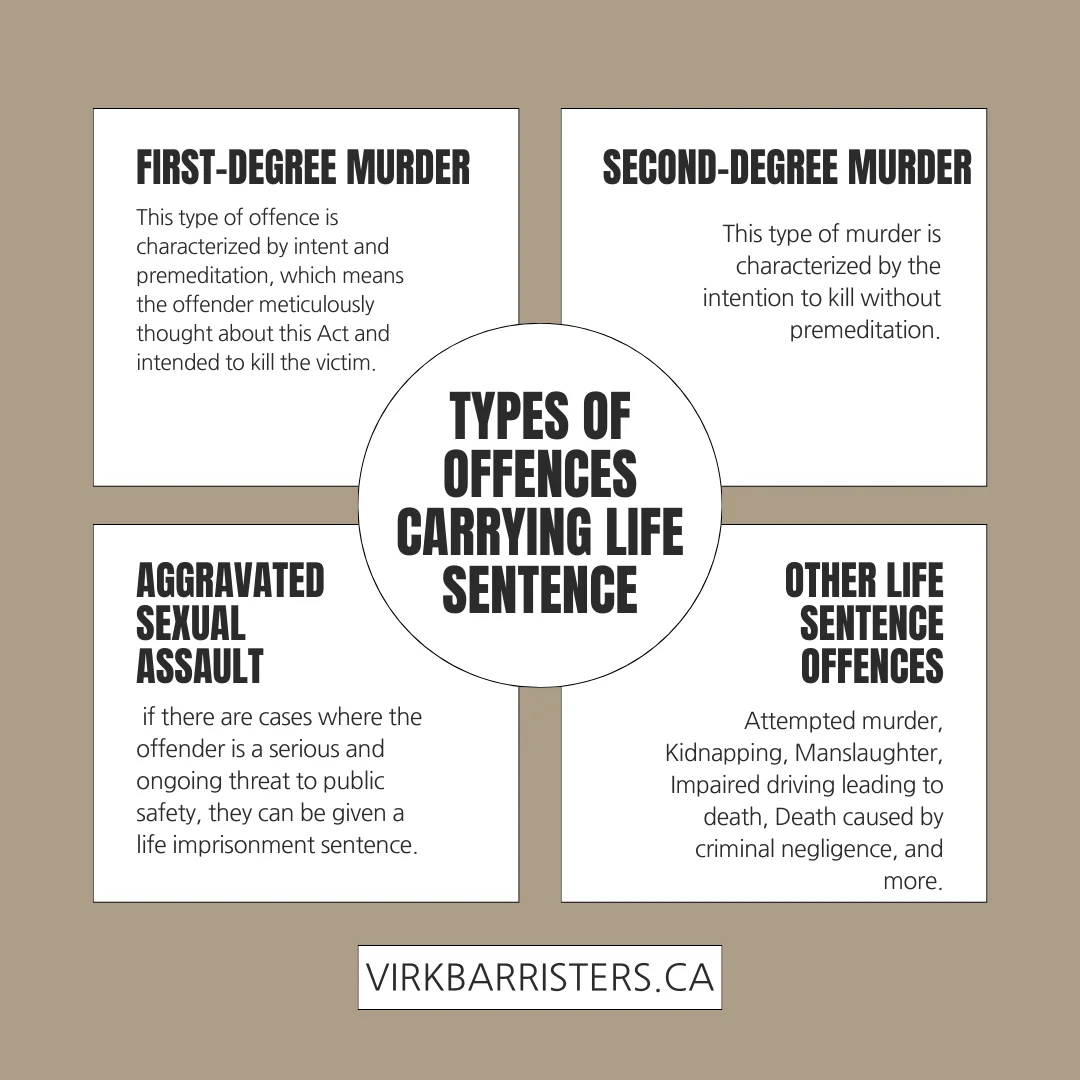
Various offences can lead to a life sentence in Canada.
1. First-Degree Murder
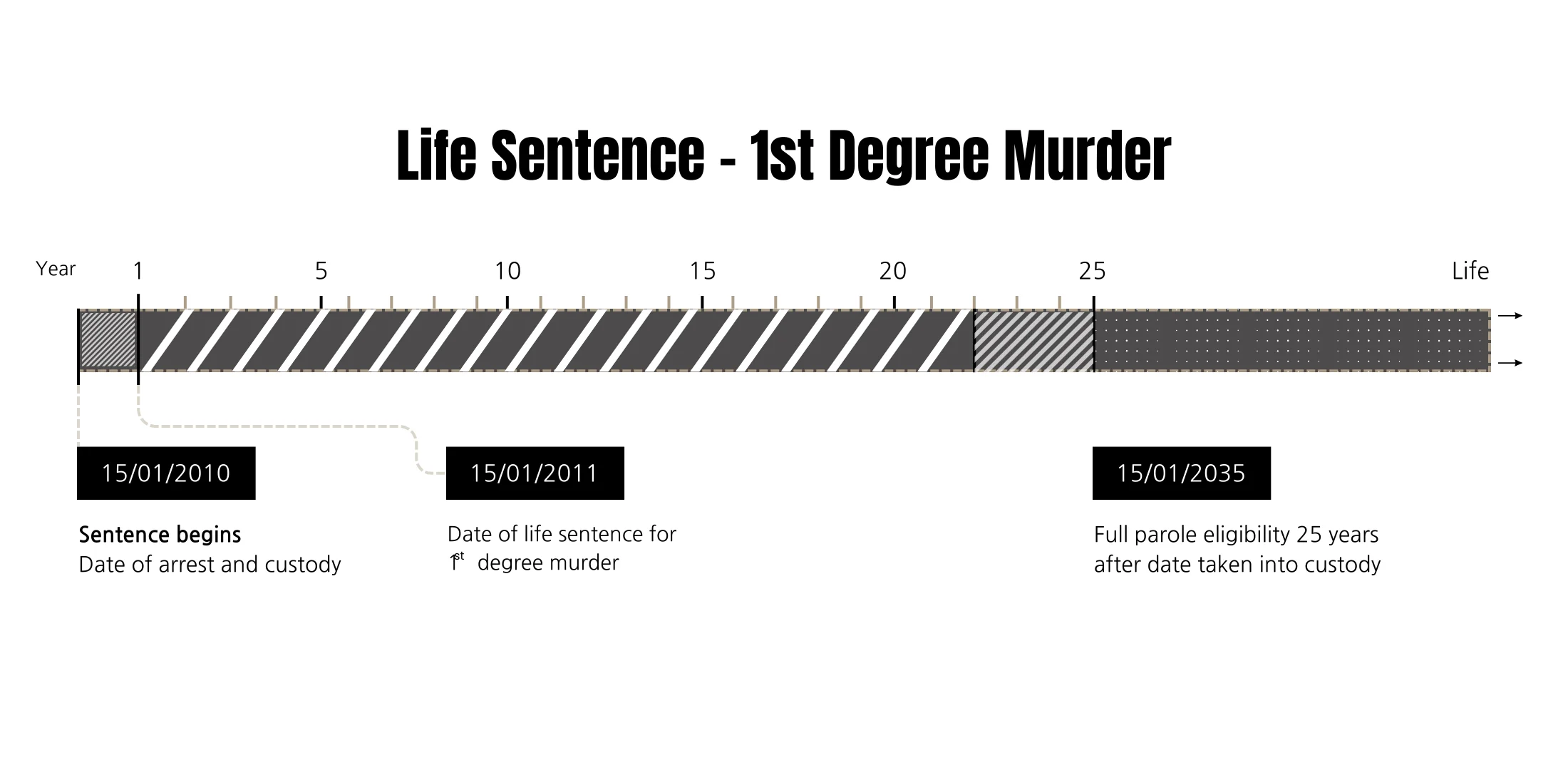
First-degree murder is the most common offence that will lead to a life sentence in Canada. This type of offence requires intent and premeditation, which means the offender thought about the act and intended to kill the victim.
When first-degree murder is proven, the offender is automatically sentenced to a minimum 25-year life sentence without any parole eligibility.
2. Second-Degree Murder
The next offence that carries a life sentence in Canada is second-degree murder. This type of murder is typically l characterized by the intention to kill without premeditation. The offender will be sentenced to life, with a parole ineligibility period ranging between 10 and 25 years.
It will be at the judge’s discretion to decide the ineligibility period of parole for this type of offence.
3. Aggravated Sexual Assault
Not all aggravated sexual assault cases in Canada can lead to a life sentence. However, if there are cases where the offender is a serious and ongoing threat to public safety, they can be given a life imprisonment sentence.
The facts of the case will largely help determine whether the offender will receive a life sentence or not.
4. Other Life Sentence Offences in Canada
Many other offences can possibly lead to a life sentence. However, the sentence will depend on the judge’s discretion after reviewing all the case facts.
Examples of some other life-sentence offences in Canada:
- Attempted Murder
- Kidnapping
- Manslaughter
- Impaired Driving Causing Death
- Criminal Negligence Causing Death
- Trafficking, exporting, or producing Schedule I or II substances that fall under the Controlled Drugs and Substances Act
Additional information regarding life sentences can be found at section 745 of the Criminal Code of Canada.
The Role of Parole in Canada for Life Imprisonment
The role of parole eligibility in Canada is an important component of understanding life imprisonment. Because of the availability of parole eligibility, it is not required that convicted offenders serve their full term of sentence. However, parole does not work to reduce the offender’s life sentence. Instead, it will change how the offender serves the sentence.
For example, parole can replace incarceration with a supervised release. So, anyone serving a life sentence will be monitored by the Correctional Services of Canada for the duration of the sentence.
Anyone who breaks the parole rules and conditions will face very severe consequences. Please note that the time for parole eligibility for life imprisonment will vary based on the factors of your case.
Applying for Parole Eligibility Review: The Faint Hope Clause
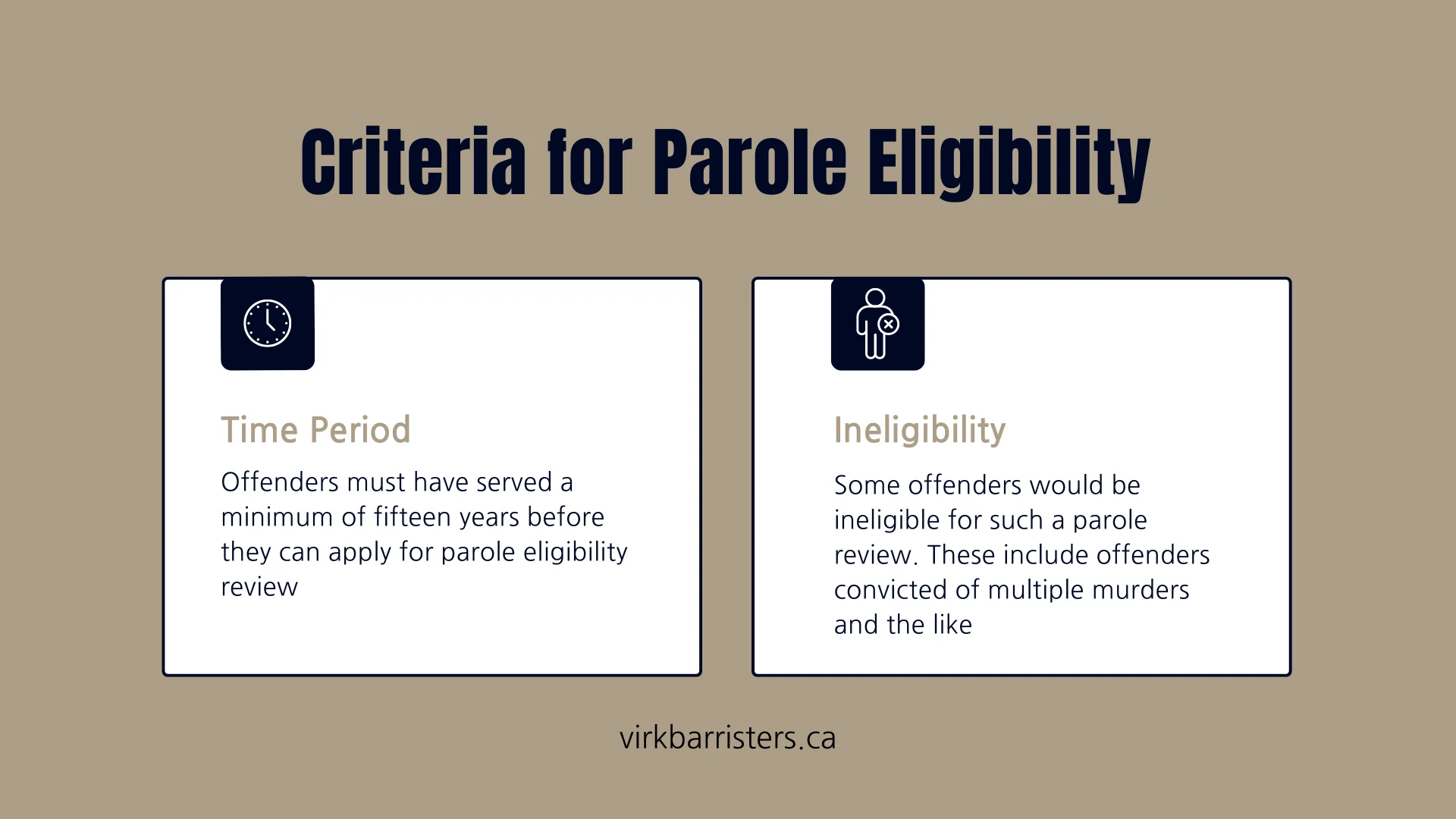
Section 745.6 of the Criminal Code of Canada is known as the faint hope clause, which was introduced in 1976. The intention behind this clause was to allow certain offenders to reduce their parole ineligibility period.
The Canadian Government wanted to incentivize good behaviour and rehabilitation among the offenders serving life sentences.
Keep in mind that the clause was not automatic, and there were strict eligibility criteria that offenders had to fulfill, which included the following:
- Time Period: Offenders must have served a minimum of fifteen years before they can apply for parole eligibility review
- Ineligibility: Some offenders would be ineligible for such a parole review. These include offenders convicted of multiple murders and the like
Even after meeting this criterion, offenders must apply to the Chief Justice of the Province where they were convicted for a reduction of the parole ineligibility period.
It would be up to the Chief Justice to designate a Superior Court Judge to create a twelve-member jury panel to hear the application and determine a verdict.
Currently, the faint hope clause is unavailable for any offences committed after December 2, 2011. The Federal Government passed Bill S-6, abolished this clause for people sentenced after December 2, 2011.
If you were sentenced before this date, you can apply for parole eligibility after serving fifteen years in prison. However, you must demonstrate exceptional circumstances and convince a jury that there is “faint hope” of parole.
If you succeed, your parole ineligibility period can be reduced to fifteen years. Please note that only a qualified criminal defence lawyer in Canada can make such an application.
Another Alternative to the Faint Hope Clause
While the Faint Hope Clause is not in motion anymore, you can still appeal for a reduction of the life sentence. This is only available in certain cases where individuals can apply for a review of their case by the Minister of Public Safety and Emergency Preparedness.
The Minister of Justice has the authority to review the conviction under federal law. The only way they will opt for release is if they think there has been a miscarriage of justice.
Sections 696.1 and 696.6 of the Criminal Code of Canada have details for the applications of a Ministerial Review.
The process is as follows:
- You submit the application for a ministerial review
- You must support this review with matters of significance
- The Minister will review your application
- Then, the Minister will either reject the application or grant a remedy to the offender
Please note that these applications are rare, and you must have a strong case for the Minister to accept your request. It is best to hire a criminal defence lawyer to create a solid application for you that will help with the possibility of a Ministerial Review.
Impact of a Life Sentence on the Offender’s Life
Long-term imprisonment is incredibly challenging, and it can alter the course of a person’s life. These offenders have to face a tough life in prison while ensuring rehabilitation and hoping they will be released.
Prisons in Canada undergo various rehabilitation programs and efforts within the system and gear the inmates toward preparing for societal reintegration.
The aim is to focus on offering psychological support, vocational training, education, and more. Such programs address the underlying issues that led to the criminal behavior on the part of the offender.
In the long run, such programs enhance growth and reduce the chances of committing the offence again. However well-intentioned this may be, having a criminal record can still alter a person’s life, especially a life sentence in Canada.
Job prospects are lowered, there is a taboo in the community against criminals, and it is difficult for offenders to reintegrate into society after spending so much time imprisoned.
FAQs
Is life 25 years in Canada?
Yes, a life sentence is typically twenty-five years. After serving this period, offenders can apply for parole eligibility.
What is the longest sentence you can get in Canada?
A life sentence of 25 years with parole ineligibility is the longest one in Canada.
How long is a life sentence in Ontario?
A life sentence in Ontario is the same as the federal law, which is 25 years.
How long is life without parole in Canada?
You have to serve twenty-five years without parole in Canada.
Contact a Criminal Lawyer in Mississauga
A life sentence in Canada is applicable to serious offenders, and it varies depending on the severity of the offence and other factors. If you or someone you know needs help navigating legal challenges with the law, you need a local criminal defence lawyer on your side.
A great criminal defence lawyer in Mississauga should be your first line of defence when addressing criminal charges. For more information, get in touch with Virk Barristers to help with your legal matters.
Author Profile

- Mr. Suny Virk is a reputable criminal defence lawyer in Mississauga focusing primarily on criminal law matters of clients. Mr. Virk has been awarded with the Certificate of Merit Award in Advocacy. Now, he wants to impart his knowledge and wisdom to other people who may be struggling with the Canadian legal system to serve his community.
Latest entries
 UncategorizedJanuary 24, 2025KNOW YOUR RIGHTS: 5 Things to Know When Getting Pulled Over by the Police
UncategorizedJanuary 24, 2025KNOW YOUR RIGHTS: 5 Things to Know When Getting Pulled Over by the Police UncategorizedJanuary 11, 2025Ignition Interlock Ontario Program Explained by an Impaired Driving Lawyer in Ontario
UncategorizedJanuary 11, 2025Ignition Interlock Ontario Program Explained by an Impaired Driving Lawyer in Ontario UncategorizedDecember 17, 2024Aggravated Assault in Canada: Explained in Simple Terms
UncategorizedDecember 17, 2024Aggravated Assault in Canada: Explained in Simple Terms UncategorizedJune 12, 2024How to Get a Peace Bond in Ontario
UncategorizedJune 12, 2024How to Get a Peace Bond in Ontario
